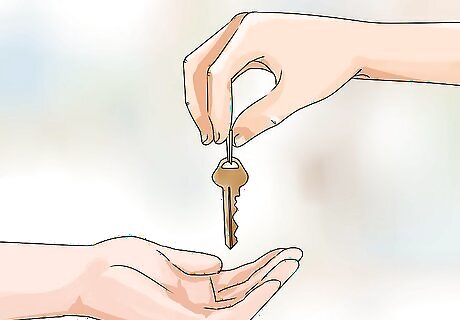
views
Taking Action Against a Stalker
Call 911 if you think you are in danger. If you are concerned about your immediate safety, do not hesitate to call for help. When you call in, make sure you clearly describe where you are and what is happening. If possible, remain as calm as you can, and try to explain the kind of help you need. The more details you can give, the more quickly the dispatcher will be able to send help. Do not hang up until the dispatcher tells you to. EXPERT TIP Sarah Schewitz, PsyD Sarah Schewitz, PsyD Licensed Psychologist Sarah Schewitz, Psy.D. is a licensed clinical psychologist by the California Board of Psychology with over 10 years of experience. She received her Psy.D. from the Florida Institute of Technology in 2011. She is the founder of Couples Learn, an online psychology practice helping couples and individuals improve and change their patterns in love and relationships. Sarah Schewitz, PsyD Sarah Schewitz, PsyD Licensed Psychologist Cut off all contact with your ex. Love and relationship psychologist Dr. Sarah Schewitz says: "If your ex is stalking you, stop answering their calls and block them online, and if it gets dangerous, call law enforcement. It's not your responsibility to help them find closure."
Cut through your denial. Your first step to stopping a stalker is to accept that you are being stalked. Stalking is not a minor problem or a small irritant. It can be dangerous, and should not be tolerated. Stalkers can be either men or women, and anyone can be a victim. If you are at all concerned about your ex and what he or she might do, it is not a sign of weakness to accept that. Only when doing that will you be able to stop it. Don’t worry about overreacting. If you feel scared, worried, or angered about someone else’s behavior, you don’t need to tolerate it. If you are concerned, act quickly.

Do not confront your stalker. Recognizing their behavior will only confirm their belief that it is working, and will encourage further stalking behavior. This means ignoring gifts, calls, and any attempts to contact you. Do not return them or respond in any way. You cannot reason with a stalker. This person has already decided that they will follow you, no matter what you say. This kind of reaction will only encourage them to continue trying, or to try even harder, to stay in touch with you.

Tell other people. If you think you are being stalked, let others know. Tell your friends, family members, or other people you trust. That way, they can help keep an eye out for your stalker, and call the police if they think something is wrong. When you tell others, be careful not to demonize your stalker. You only need to let others know about them, not tell them how terrible they are. Unless something dangerous has already happened, demonizing them can only help to escalate the situation with others. In addition to your circle of friends, consider talking to a group like HAVEN, which can provide support, encouragement, and legal advice for someone facing a stalker or other abusive relationship.
Keep a record of stalking activities. Note exactly what happened, along with when and where it took place. Keep a record of every phone call, including the ones you don’t answer, every text, every email, and every confrontation you have. If the situation escalates, and you need to take legal action, this will be important evidence to have available. If you are concerned that your ex has access to your computer, or other means of manipulating an online list, consider writing these events down in a journal. This can be more permanent, and less susceptible to outside tampering. Texts, emails, and phone calls are not evidence of stalking by themselves. While you can prove that the email came from your ex’s address, that doesn’t mean that they sent it. You should still hold on to these, as they can be helpful evidence when building a case for a restraining order.
Get a restraining order. A restraining order is a court order that prevents a stalker or other abuser from coming into contact with you. Go to your local courthouse and fill out a petition for a restraining order. You will need to include an affidavit that explains what your stalker has been doing. This is where your record of his actions can be helpful. Since this is a legal document, you may want to consult a lawyer when filing the order. Of course, lawyers can be expensive, so you can also reach out to a domestic violence hotline, or other staff members in the courthouse about your options. Of course, a restraining order is only a legal document and not a guarantee. It can make it easier to arrest and prosecute, but won’t actually stop them from stalking you. You will still need to be alert and prepared to defend yourself.
Be prepared to defend yourself. You never know if or when your stalker will put you in physical danger, so you need to be prepared. Self-defense involves keeping yourself alert and out of dangerous situations, but also being prepared to fight back if there is trouble. Some self-defense techniques are as simple as staying alert when you walk around or having your car keys out and ready so you aren’t searching for them in the parking lot. Don't let your inattention be an opening for someone else. Look for self-defense classes offered in your area. You can probably find them through police departments or local schools. In addition, basic training in some form of martial arts can give you the skills and confidence to defend yourself, at least long enough to escape to a safer place. If you haven’t learned new techniques, or aren’t comfortable using them, having something like pepper spray on you is a good back-up plan.
Change your daily routine. Because they know you so well, your ex will probably be able to keep track of you by visiting the same locations you do. While this is certainly annoying, you should consider modifying your favorite places and usual routes to prevent them from easily following you. Look for things you can easily change, like places you shop and eat, or things like the gym you go to. Try to find different ways to get to your important locations, so your stalker can’t track you along the way. While you probably can’t change your school and work hours, it can never hurt to ask, especially if you are concerned for your safety. If you do need to make drastic changes to your schedule, keep paper records of the financial effect this has on you. This can be good evidence for legal proceedings, and can even be the basis for financial reimbursement if the changes are serious enough.
Dealing with Cyberstalking from an Ex
Change your passwords. Your ex probably knows a few of your passwords to things like social media accounts and email, as well as even more sensitive information like your bank account. Don’t give them the chance to mess with these items, or use them to track your activity. Make sure your new password is secure. The traditional advice is to make your password a combination of upper and lower case letters, numbers, and symbols. Keep your passwords in a secure place, and only enter them on secure websites. Another way you can create a strong password is to take the first letter of each word, plus numbers and symbols, in two simple sentences. For example, the phrase "My first pet was a dog named Fido. Got him in 1993." would become the password "MfpwadnF.Ghi1993." It is long and has a mixture of upper and lower case letters, numbers, and symbols. Since it doesn't read as any word that would appear in a dictionary, it is harder for someone else to figure out. Plus, since it can refer to a sentence only you know, it should be easier for you to remember.
Use anti-virus software. There are a number of good products out there that will keep your computer secure. Make sure your computer always has an up-to-date security system. If it gives you the option to update automatically, take it. If your ex is particularly tech-savvy, they may try to use a virus or Trojan horse application to track your movements and computer activity without getting on your actual computer. Use the anti-virus software to keep your computer clean, and get rid of anything that might be used to follow your activity.
Clean up your social network. Online social networks like Facebook are a good resource for tracking someone. Make sure you clear out your social media accounts to prevent your ex from having ways to keep tabs on you. Update your privacy settings so that only your friends are allowed to see your posts. After your break-up, unfriend your ex so that they cannot track you through the network. Make sure to ignore all friend requests from them. Be very careful about adding new friends, especially people who know your ex, as your ex could keep an eye on you through them. Don’t be afraid to unfriend other mutual friends, especially if you are concerned that your ex will use them to track you. It may feel mean, but that is not important. Your safety is what comes first, and you cannot overreact to a stalker. Don't make posts that clearly show your whereabouts or anything that would let your ex find you quickly. This means avoiding obvious landmarks like your workplace, school, street signs, or anything else that would let someone who knows you figure out where you are.
Make your online materials private. This means things like your personal calendar, which would allow a stalker to follow you and know where you are planning to be. Check privacy settings on any websites you frequent to make sure nothing is accessible to anyone you wouldn’t want to see it. Run your name through a search engine to see what is connected to you. If you find information about yourself that you would not like publicly available, get rid of it. That may mean asking your friends to remove social media posts that tag you.
Ending An Abusive Relationship
Notice signs of control in your relationship. Stalking is about control. If your partner has been trying to control you, they are more likely to continue doing so after you have broken up. Some of these signs include: Regularly belittling you, putting you down, or discouraging your dreams and personal growth. Trying to cut you off from your friends and family. Getting jealous when you do something without them, especially with others. Constantly checking up on you, wondering where you are and what you are up to. This certainly isn’t a guarantee that you will be stalked, but it can be a warning sign that your ex might try after the break-up.
Make your break up clear. There should be no doubt in your mind that you have ended the relationship with this person. The important thing is that there can be no confusion that you do not want to see this person anymore. While you may be tempted to let your ex down easily, you need to be firm and clear that you want to end the relationship. A potential stalker will use any potential opening as an excuse to continue following you, so don’t give one. If you are fearful of the other person’s reaction, make sure to break up in a public place. While this generally isn’t a nice idea, you shouldn’t be alone if you are concerned for your safety. Your security comes first.
Cut off contact. This means phone calls, emails, texts, and any other forms of communication. Aside from cutting your ex off and not giving them a way to track you, it will also help you get past the relationship. This includes social media. Delete pictures or other items of the two of you together and block your ex. This will help prevent her from stalking you, and make it easier to move on by removing the means to stalk her in response. Reader Poll: We asked 250 wikiHow readers about how they use social media after a breakup, and 49% of them said that they block their ex and make their profile private. [Take Poll]

Get back your keys. You and your significant other probably shared keys and other items as a way to stay close. Now that you have broken up, get your keys back. You don’t want to give them any access to you or your things. If you aren’t going to be able to get your keys back, it is a good idea to change your locks. You shouldn’t allow such easy access into your home to someone you don’t want to see anymore.




















Comments
0 comment